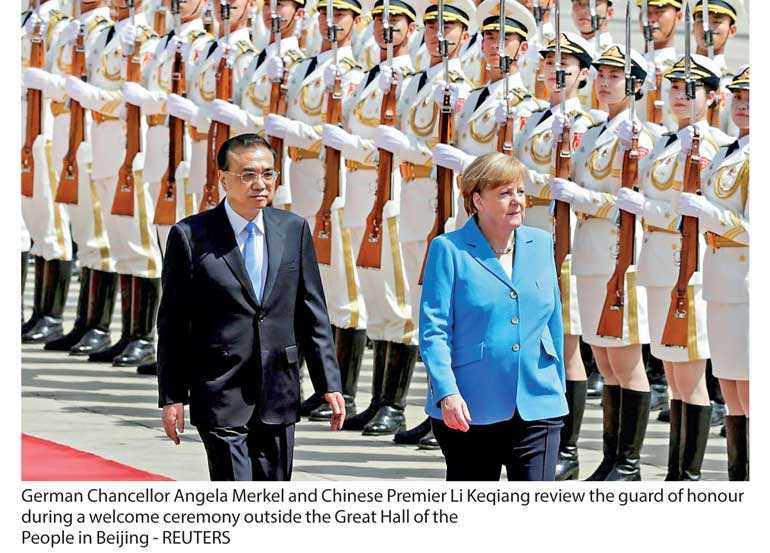Wednesday Feb 18, 2026
Wednesday Feb 18, 2026
Friday, 25 May 2018 00:00 - - {{hitsCtrl.values.hits}}

Beijing (Reuters): China said on Thursday it would “open its door wider” to German businesses, giving a warm reception to visiting Chancellor Angela Merkel, who has wooed Beijing to counterbalance trade threats from US President Donald Trump.
Germany and China, two exporting nations that run large trade surpluses with the United States, have found themselves in Trump’s firing line and are scrambling to preserve the multi-lateral order on which their prosperity rests.
Merkel faces a delicate balancing act on the trip to show Chinese-German solidarity over trade and the Iran nuclear deal without harming ties with long-term ally Washington.
In the latest US trade move that has alarmed Beijing and Berlin alike, the Trump administration announced on Wednesday a national security investigation on into car and truck imports that could potentially lead to tariffs.
The announcement hurt share prices of both European and Asian carmakers. China vowed to protect its interests.
European countries are also concerned that their exporters could be hurt if China instructs importers to buy more US goods to ease trade disputes with the Trump administration. China has already signalled to state companies to buy more US oil and soybeans, trade sources told Reuters.
Premier Li Keqiang, in a joint media appearance with Merkel at Beijing’s Great Hall of the People, said China and Germany both upheld global free trade, and stressed the huge potential for cooperation between them.
Though the two countries had problems, they could be overcome, Li said. “China’s door is open. You can say it will open even wider,” Li said.
Trump’s “America First” trade policy, his administration’s professed disdain for the World Trade Organisation, as well as his withdrawal from the Iran nuclear deal, have pushed China and Germany into closer alignment, German officials say.
However, Merkel’s government also shares many of the Trump administration’s concerns about Chinese business practices, including what many Western countries say are state-backed efforts to push foreign companies to give up trade secrets.
In Copenhagen, the chief executive of Maersk, the world’s biggest container shipper, said China was “becoming more and more assertive about its own agenda – a China that uses its competition laws for own benefit” in the shipping sector.
“We look with concern at the growing protectionist rhetoric around the world,” Soren Skou said. “The EU will be the decisive driving force in free trade, not the least at a time when it seems the United States doesn’t want to take the lead.”
‘Striding forward’
Li said Beijing would protect the interests of German firms investing in China and adjust its rules if needed: “If they come across any problems during their investment, especially when it comes to legal protections, I can clearly tell you that China is striding forward to being a country with rule of law.”
German companies have complained for years about barriers to the Chinese market and intellectual property theft.
Merkel welcomed China’s recent announcements that it would further open its financial sector to foreign participation and reduce Chinese joint venture requirements in sectors such as automobiles. But German industry said it was now up to China to deliver on its promises of greater openness.
“China must rigorously reduce the asymmetries in market access,” said Hubert Lienhard, head of the Asia Pacific Committee of German Industry (APA).
Trump has also driven Europe to work more closely with China by pulling out of a 2015 deal to lift sanctions against Iran in return for curbs on its nuclear program. European countries, Russia and China, all parties to the deal, are searching for a way to salvage it by continuing to offer economic benefits to Iran in return for its compliance, despite US sanctions.
Merkel, who personally lobbied Trump not to pull out of the pact but was rebuffed, said Germany and China were “united in the view that we do not want to put this agreement in doubt”.
In a nod to China, Merkel said that if US sanctions force European companies to reduce business with Iran, “this creates the possibility for others to then get more into Iran.”